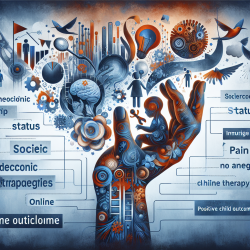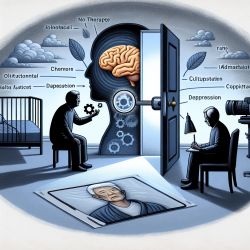Introduction
In the field of speech-language pathology, data-driven decisions are crucial for enhancing therapeutic outcomes, particularly in children. However, insights from other domains, such as rheumatology, can offer valuable lessons. The recent study titled "Socioeconomic status, reserve capacity, and depressive symptoms predict pain in Rheumatoid Arthritis: an examination of the reserve capacity model" provides an excellent framework for understanding how socioeconomic factors and psychological resources impact health outcomes. This blog explores how practitioners can apply these findings to improve their skills and encourage further research.
Understanding the Reserve Capacity Model
The reserve capacity model is a theoretical framework that examines how socioeconomic status (SES) influences health outcomes through psychosocial resources and emotional factors. In the context of rheumatoid arthritis (RA), the study found that lower SES is associated with worse pain outcomes, mediated by reduced reserve capacity (such as helplessness, self-efficacy, and social support) and increased negative emotions.
Key Findings and Implications
The study's findings revealed several critical insights:
- Low SES contributes to worse pain outcomes in RA patients through diminished reserve capacity and heightened negative emotions.
- Reserve capacity and negative emotions partially mediate the relationship between SES and pain.
- Interventions targeting negative emotions and enhancing reserve capacity could improve pain management in RA patients.
These insights are not only relevant to rheumatology but can also inform therapeutic practices in speech-language pathology, particularly when addressing the needs of children from diverse socioeconomic backgrounds.
Applying the Findings in Practice
For practitioners in speech-language pathology, integrating the reserve capacity model can enhance therapeutic outcomes by:
- Assessing Socioeconomic Factors: Understanding the SES of children and their families can help tailor interventions to address specific challenges and barriers.
- Building Reserve Capacity: Fostering self-efficacy and social support in children can enhance their resilience and ability to cope with communication challenges.
- Addressing Emotional Factors: Incorporating strategies to manage negative emotions can improve engagement and outcomes in therapy.
Encouraging Further Research
The study highlights the need for further research to explore the reserve capacity model's applicability across different populations and conditions. Practitioners are encouraged to engage in research initiatives that examine the interplay between SES, reserve capacity, and therapeutic outcomes in speech-language pathology. Such research can lead to more precise interventions and improved outcomes for children.
Conclusion
The reserve capacity model offers a valuable framework for understanding how socioeconomic and psychological factors influence health outcomes. By applying these insights, practitioners can enhance their skills and contribute to better outcomes for children in speech-language pathology. For those interested in delving deeper into the research, the original study provides a comprehensive analysis of these dynamics.
To read the original research paper, please follow this link: Socioeconomic status, reserve capacity, and depressive symptoms predict pain in Rheumatoid Arthritis: an examination of the reserve capacity model.










